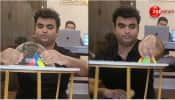Mumbai: Observing that there was no evidence to suggest that a dowry victim was subjected to cruelty, the Bombay High Court has set aside the trial court`s order, which sent to jail a man and his family for abetting the suicide of his wife in 1991.
The victim, Kusum, died of burns in a fire at her matrimonial home, when she was in the eighth month of pregnancy.
Her father lodged a police complaint alleging that she had committed suicide and they were pressurised to give dowry after the marriage in the form of gold and articles.
"There is no evidence worth acceptance to show that the victim was ever treated with cruelty as defined in Section 498A of IPC for meeting any unlawful demands," observed Judge R C Chavan while acquitting the convicts.
"The story of dowry demands seems to have surfaced only after the unfortunate incident and it cannot be said that the findings recorded by the learned trial Judge are in tune with the evidence tendered before him," the judge noted in a recent order.
"The evidence is consistent with the innocence of the appellants," the judge said and did not agree with the trial court`s finding that the victim was ill-treated, as she failed to meet the demand of her in-laws to produce the receipt of jewellery given in marriage in order to pledge the gold.
Allowing the appeal, the judge set aside the trial court`s order sentencing victim`s husband Maruti Tilekar, brother Balu and mother Parvatibai, residents of Pune, to suffer RI in jail for three and two years concurrently under sections 306 (abetment to suicide) and 498A (cruelty) IPC.
The High Court took into account the evidence of a panchnama witness, Nandkumar, who said he had seen a kerosene tin and dough in the room, indicative of the fact that the victim was possibly about to cook some food.
The panchmana showed that the house was locked from inside and police had to remove iron bars by breaking through a window.
"Thus, it is not that the victim had suffered burn injuries when somebody was present in the house and had provoked her to set herself on fire," the judge noted.
The court accepted the argument of appellants that Nandkumar had not been declared hostile and his observations about the presence of dough near the stove would be indicative of the possibility that there was accidental fire rather than the victim having committed suicide.
Counsel for the appellants S G Deshmukh submitted that the learned trial judge had wrongly drawn an inference that the victim was subjected to cruelty or that she was provoked to commit suicide solely on the basis of misreading of letters written by her.
They pointed out that the letters did not refer to any unlawful demands made by the appellants.
He further argued that the story of dowry demand, which has surfaced after the unfortunate incident, should have been rejected by the trial judge in the face of the fact that none of these demands or references to the demands could be found in the police statement of victim`s father, Ramchandra.
The court also agreed with his contention that if for the first 3 to 4 months the victim was treated well, there would be no occasion for her sisters to come to know that she was ill-treated or some unlawful demands were made to her.
PTI















